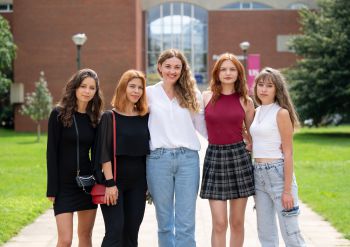News
See our news stories for culture, equality and inclusion at Sussex.
Ukrainian students enjoyed summer on campus thanks to Sussex Fund
Posted on behalf of: University of Sussex
Last updated: Tuesday, 3 September 2024

L-R: Alina, Yuliia, Associate Professor Honsalies-Munis, Ivanna, and Yelizaveta
Four Ukrainian students and one faculty member from our partner university, Oles Honchar Dnipro National University (DNU), recently visited Sussex for a summer of studying and social and cultural events.
Yuliia, Yelizaveta, Ivanna and Alina arrived in the UK along with visiting faculty member, Associate Professor Svitlana Honsalies-Munis, from Ukraine on 3 August – after a journey which took almost three days.
The students attended Summer at Sussex during August, aiming to improve their English language skills and increase their understanding of British life and culture. Their scholarships have been funded by donations to the Sussex Fund.
The Sussex Fund aims to help students stay and succeed at university, and the schemes can provide a safety net for all students, irrespective of their background or nationality. The Sussex Fund also partly funds the Hardship Fund, which is open to all students in need and those from regions that are experiencing war and conflict.
For the four Ukrainian students, their time at DNU has been entirely remote, and this experience at Sussex has allowed them to connect with academics face-to-face, visiting local landmarks and enjoying social activities with other students from our Pre-sessional English and Undergraduate Summer School courses.
Alina, a second-year student studying marketing at DNU, said that she was nervous to come to the UK to study, as she knew it would be very different from her experiences so far.
Alina said: “The teachers here have been incredibly supportive and I have learnt a lot. We all long to study in-person, to see each other, and to ensure that everyone is safe, healthy, and happy, and I am immensely grateful to have had this opportunity to study at Sussex.”
The visit also allowed the Global Engagement team to explore some further collaborative opportunities with DNU and connect Associate Professor Honsalies-Munis to her academic counterparts in the Faculty of Media, Arts & Humanities.
Gavin Mensah-Coker, Head of English Language, in the Faculty of Media, Arts & Humanities, expressed his delight in welcoming the Ukrainian students: “It was with immense pleasure that we at Sussex welcomed our Ukrainian students to their English courses this summer on our beautiful university in the South Downs. We know that they haven’t had a typical university experience back home in Ukraine, and hope that through this trip, they can both learn and take home some wonderful memories of their time in the UK. As a University of Sanctuary, we are committed to making the University a welcoming and safe place for all.”
About our partnership with Oles Honchar Dnipro National
Since the Russian invasion of Ukraine in 2022 over 100 UK universities have been twinned with Ukrainian ones in the hopes of reducing ‘brain drain’ and to support the Ukrainian institutions through the crisis. The initiative, which received a £5 million UK Research and Innovation (UKRI) investment in late 2022, has been instrumental in keeping Ukrainian campuses operational, enabling academics to continue their work, and providing students with opportunities to pursue their studies.
The University of Sussex is proud to partner with DNU, supporting students and academics affected by the conflict. Sussex has also extended its European Partnerships Development Fellowships (EPDF) to DNU, promoting research collaboration and capacity-building activities. Discussions are ongoing to further these efforts through the EPDF scheme.
Professor Kate O'Riordan, Pro-Vice-Chancellor (Education & Students) said: “It was wonderful to have the Ukrainian students on campus and engaging with the opportunities on offer during a summer at Sussex. As a university, Sussex is firmly committed to supporting educational resilience in times of crisis, and I hope that we will be able to offer similar opportunities to students from other areas of conflict in the future.”